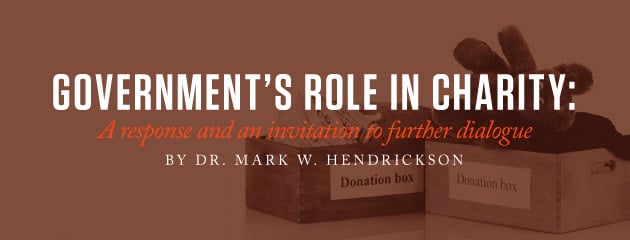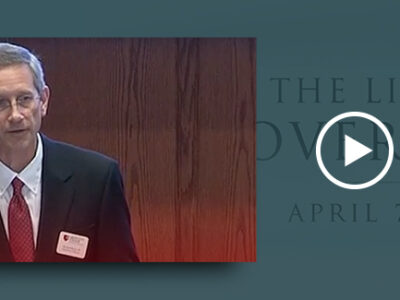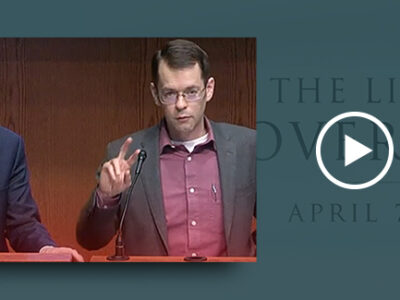
Editor’s note: On Dec. 23, 2013, Dr. Mark Hendrickson wrote an op-ed titled, “One of the most powerful Christmas lessons.” A reader of the Stewartville STAR (Minn.) responded with a letter-to-the-editor making the following arguments:
- “Hendrickson argued that Jesus did not teach political-economics based redistribution of charity. What this sleight-of-hand argument doesn’t also clarify is this: Jesus also did not teach against it. So Hendrickson’s ‘argument from silence’ lacks foundation.”
- “Hendrickson states that Jesus never condoned the use of force or harm and that Jesus ‘never used force to compel others to do good.’ Yet this same Jesus said that His followers should pay taxes to Caesar if Caesar chooses to tax. … So unless Hendrickson wants Christians to rebel against their government and not pay taxes, then his argument has been cut off at the knees.”
- “At current levels of donations, the churches and the charities in America simply do not have the financial resources to be the safety net for millions of Americans who need assistance. As a pastor and community leader who works with social services of many kinds on a regular basis, I am extremely grateful to live in a state and country that value caring for the marginalized, the hurting, the neglected, the abused, and the hungry.”
The reader is a pastor in Minnesota, who we’ve identified here as simply “reader.” Here’s Hendrickson’s response, which we hope will be part of an ongoing dialogue on Christians, charity, and the state. We eagerly invite those who disagree to respond and continue the discussion. We are happy to provide a platform for those with different views who wish to engage this crucial subject.
Mark Hendrickson’s reply:
Let’s continue this important discussion.
The [reader] takes the position that since the Bible directs Christians to be generous and charitable, we should enlist the aid of the state for charitable purposes. This is a non sequitur. He ignored rather than rebutted the Scriptural passages I cited, and I looked in vain for him to cite Biblical verses that would support his position in favor of a government role in charity, so let’s move on and examine this issue from another perspective.
The [reader] adopts an “end justifies the means” approach, stating that because churches “do not have the financial resources to be the safety net,” then the state should step in. (Incidentally, if the state hadn’t appropriated trillions of dollars from the private sector over the years, the private sector would have created far more jobs, thereby lessening the need for charity, and also would have more funds for charitable activities.) Let’s consider a few of the problems with government intervention in charity.
The consensus of earlier generations of Americans, and particularly our founding fathers—overwhelmingly committed Christians—was that charity is not a proper function of the federal government. In 1794, James Madison, the future president who had been arguably the chief architect of our Constitution, vigorously fought and helped to defeat a proposed congressional appropriation to provide relief to some refugees. His explanation: “I cannot undertake to lay my finger on that article of the Constitution which granted a right to Congress of expending, on objects of benevolence, the money of their constituents.” Madison continued, “Charity is no part of the legislative duty of the government.” Later presidents, up through at least Grover Cleveland in the 1890s, vetoed bills for the same reason.
Americans’ concept of government began to change in the late 1800s. The emergent progressive movement advocated an expanded role for the federal government, desiring to make it an instrument for the economic betterment of Americans.
Once you cross that line and accept the theory that it is government’s responsibility to take care of the economic needs of citizens, where do you draw the line? Once you give a certain amount, why not more? Once you give to him, why not to her? Adopting the progressive position and repudiating the constitutional order established by our founders is why the government is more than $17,000,000,000,000 (that’s $17 trillion) in debt today. Where is the charity in imposing such a burden on our children?
The [reader] makes the same dangerous assumption that many well-meaning advocates of government intervention make—that government will redistribute wealth wisely and justly. In fact, once a state gains the awesome power to redistribute wealth, greed runs rampant and produces unjust wealth transfers such as: the bulk of federal entitlements going to the wealthiest segment of the population (namely, retirees); bailouts of mega-corporations; and worthless boondoggles like Solyndra that divert millions to the politically connected. Once wealth redistribution by government is accepted, Pandora’s Box is opened and the plague of cronyism runs rampant on the road to bankruptcy.
For Christians to enlist the power of the state to impose their values on others is problematical, both politically (separation of church and state) and morally (it violates both property rights and the Golden Rule). It is also ethically problematic considering that most of the trillions of dollars spent in Uncle Sam’s War on Poverty since the ‘60s has gone to middle-class citizens, millions with college degrees staffing the massive federal poverty bureaucracies rather than to the poor. So we find we have just as many poor people now as 50 years ago, whereas earlier, without government “assistance,” poverty declined during every previous generation in American history (except for the interruption of the Great Depression). With voluntary charity, you have positive-sum (win-win) transactions—the giver is glad to give and the recipient to receive. Introducing force—making someone surrender some of his property against his wishes—involves winners and losers. Is it Biblical charity to help one citizen by hurting another? (And be careful of saying that a majority vote sanctifies such a process; it was a majority vote that released Barabbas and condemned Jesus to the cross. Majorities aren’t always right.)
The [reader] throws a red herring into the argument when asking if I advocate a tax rebellion. I don’t, but I do think we need to rethink the proper role and scope of government. Jesus didn’t outline a political agenda for his disciples to follow, so we have to work this out for ourselves. He did make it clear, though, that Caesar’s realm and God’s realm are distinct. My suggestion: Let’s leave the use of force (armies, jails, etc.) to government and voluntary deeds of benevolence where Jesus placed them—at the center of Christian life.




